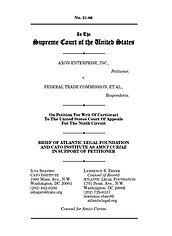Learn more about Cato’s Amicus Briefs Program.
Axon, a body camera manufacturer, bought a competitor in 2018 and thereby incurred “antitrust concerns” at the Federal Trade Commission (FTC). After investigating for 18 months, the FTC threatened to initiate an in-house enforcement proceeding, unless Axon agreed to onerous settlement terms. In response, the company filed suit in a federal district court, arguing that the FTC’s in-house courts are unconstitutionally stacked in favor of the government; in fact, the agency hasn’t lost on its home turf in more than a quarter century.
The district court sided with the government, holding that Axon could bring its constitutional challenges against the FTC’s in-house court system only after the company first raised these arguments before the agency in the very proceedings that Axon challenges on constitutional grounds. The district court’s holding makes little sense—after all, is it remotely plausible that the FTC would find itself unconstitutional? The district court’s order further offends fundamental notions of fairness. Axon should not be required to suffer the crippling cost, business disruption, and adverse outcome of an FTC in-house proceeding before seeking judicial review of that proceeding’s constitutional legitimacy.
A divided Ninth Circuit panel upheld the district court, despite conceding that “it makes little sense to force a party to undergo a burdensome administrative proceeding to raise a constitutional challenge against the agency’s structure before it can seek review from the court of appeals.” Ultimately, the majority felt bound by the Supreme Court, due to a misreading of that Court’s precedent.
Axon has since petitioned the Supreme Court to review the Ninth Circuit’s holding. Today, the Cato Institute joins the Atlantic Legal Foundation on a brief in support of the petitioner. We urge the Court to take this case and clarify to lower courts that justice delayed is justice denied.
Read on: ALF Brief Supports Supreme Court Review of “Justice Delayed is Justice Denied” Appeal

This work is licensed under a Creative Commons Attribution-NonCommercial-ShareAlike 4.0 International License.



